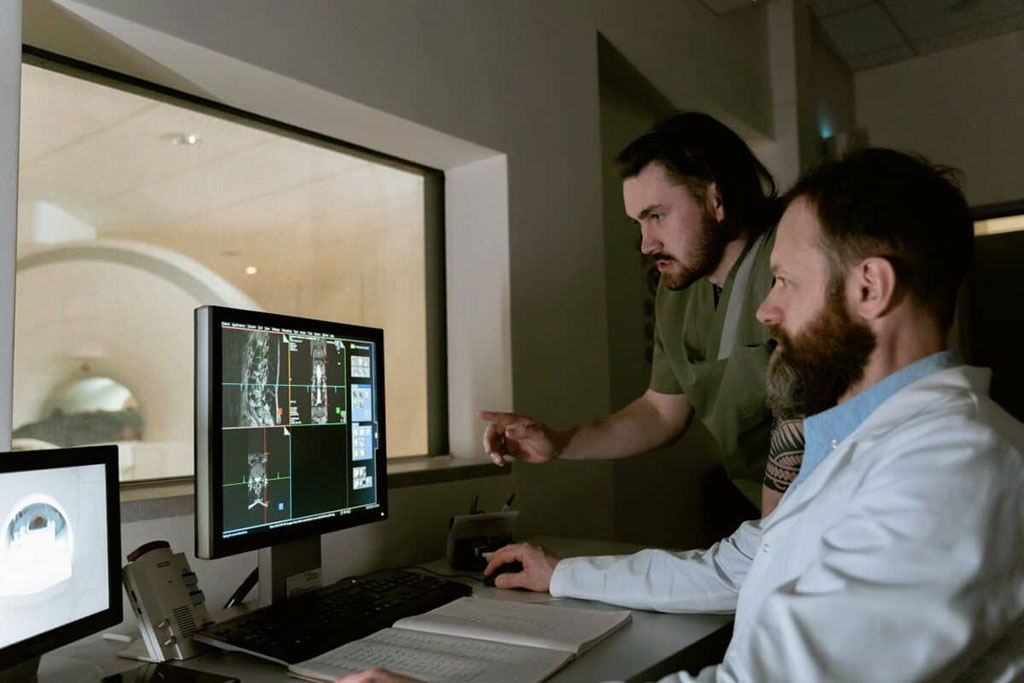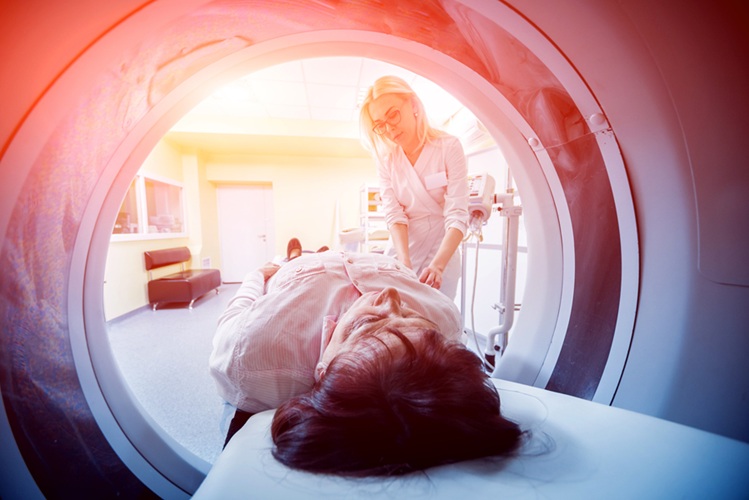Artificial Intelligence Technology Produces CT Images Based on MRI Without Exposure to Radiation
|
By MedImaging International staff writers Posted on 11 Nov 2021 |

Researchers have developed an artificial intelligence (AI) technology to generate CT images based on MRI images without exposure to radiation.
The results of a simulation experiment conducted by researchers at the Korea Institute of Science and Technology (KIST; Seoul, South Korea) have shown that the transcranial focused ultrasound procedure could be performed with MRI alone. Transcranial focused ultrasound can be used to treat degenerative movement disorders, intractable pain, and mental disorders by delivering ultrasound energy to a specific area of the brain without opening the skull. This treatment must be performed with an image-based technology that can locate the brain lesions.
Doctors typically use CT to obtain information about a patient's skull that is difficult to identify with MRI alone and to accurately focus the ultrasound on the lesions through the skull. However, there have been concerns about the safety of CT scans, during which radiation exposure is inevitable, especially in pediatric and pregnant patients. Efforts have been made to obtain cranial information from MRI images, but special coils for the MRI or imaging protocols that are not widely available in the medical field are required. As an alternative, interest for acquiring AI-based CT images has been high worldwide, but their clinical efficacy has not been proven.
The KIST research team proved that CT images obtained by AI have clinical utility. The researchers developed a three-dimensional conditional adversarial generative network that learns the nonlinear CT transformation process from T1-weighted MRI images, which is one of the most commonly used images in the medical field. The team devised a loss function that minimizes the Hounsfield unit pixel variation error of the CT images, and also optimized the neural network performance by comparing the changes in quality of the synthetic CT images according to the normalization methods of MRI image signals, such as Z-score normalization and partial linear histogram matching normalization.
For safe and effective ultrasound treatment, it is imperative to understand each patient's skull density ratio and skull thickness in advance, and when these skull factors were obtained via the synthetic CT, both factors showed >0.90 correlation with the actual CT. There was no statistically significant difference. Moreover, when simulated ultrasound treatment was performed, the ultrasound focal distance had an error of less than 1 mm, the intracranial peak acoustic pressure had an error of approximately 3.1%, and the focal volume similarity was approximately 83%. This demonstrated that the transcranial focused ultrasound treatment system can be performed with only the MRI image.
"Patients can receive focused ultrasound treatment without being worried about radiation exposure, and as the additional imaging and alignment processes can be omitted, this will reduce the staff's workload, leading to a reduction in time and economic costs," said Dr. Hyungmin Kim at KIST’s Bionics Research Center. "Through follow-up studies on identifying the error associated with the ultrasound parameters and transducers and understanding the possibility of artificial intelligence CT application in various parts of the body, we plan to continue developing the technology for its applicability in various treatment technologies."
Related Links:
Korea Institute of Science and Technology
Latest MRI News
- Cutting-Edge MRI Technology to Revolutionize Diagnosis of Common Heart Problem
- New MRI Technique Reveals True Heart Age to Prevent Attacks and Strokes
- AI Tool Predicts Relapse of Pediatric Brain Cancer from Brain MRI Scans
- AI Tool Tracks Effectiveness of Multiple Sclerosis Treatments Using Brain MRI Scans
- Ultra-Powerful MRI Scans Enable Life-Changing Surgery in Treatment-Resistant Epileptic Patients
- AI-Powered MRI Technology Improves Parkinson’s Diagnoses
- Biparametric MRI Combined with AI Enhances Detection of Clinically Significant Prostate Cancer
- First-Of-Its-Kind AI-Driven Brain Imaging Platform to Better Guide Stroke Treatment Options
- New Model Improves Comparison of MRIs Taken at Different Institutions
- Groundbreaking New Scanner Sees 'Previously Undetectable' Cancer Spread
- First-Of-Its-Kind Tool Analyzes MRI Scans to Measure Brain Aging
- AI-Enhanced MRI Images Make Cancerous Breast Tissue Glow
- AI Model Automatically Segments MRI Images
- New Research Supports Routine Brain MRI Screening in Asymptomatic Late-Stage Breast Cancer Patients
- Revolutionary Portable Device Performs Rapid MRI-Based Stroke Imaging at Patient's Bedside
- AI Predicts After-Effects of Brain Tumor Surgery from MRI Scans
Channels
Radiography
view channel
AI Improves Early Detection of Interval Breast Cancers
Interval breast cancers, which occur between routine screenings, are easier to treat when detected earlier. Early detection can reduce the need for aggressive treatments and improve the chances of better outcomes.... Read more
World's Largest Class Single Crystal Diamond Radiation Detector Opens New Possibilities for Diagnostic Imaging
Diamonds possess ideal physical properties for radiation detection, such as exceptional thermal and chemical stability along with a quick response time. Made of carbon with an atomic number of six, diamonds... Read moreMRI
view channel
Cutting-Edge MRI Technology to Revolutionize Diagnosis of Common Heart Problem
Aortic stenosis is a common and potentially life-threatening heart condition. It occurs when the aortic valve, which regulates blood flow from the heart to the rest of the body, becomes stiff and narrow.... Read more
New MRI Technique Reveals True Heart Age to Prevent Attacks and Strokes
Heart disease remains one of the leading causes of death worldwide. Individuals with conditions such as diabetes or obesity often experience accelerated aging of their hearts, sometimes by decades.... Read more
AI Tool Predicts Relapse of Pediatric Brain Cancer from Brain MRI Scans
Many pediatric gliomas are treatable with surgery alone, but relapses can be catastrophic. Predicting which patients are at risk for recurrence remains challenging, leading to frequent follow-ups with... Read more
AI Tool Tracks Effectiveness of Multiple Sclerosis Treatments Using Brain MRI Scans
Multiple sclerosis (MS) is a condition in which the immune system attacks the brain and spinal cord, leading to impairments in movement, sensation, and cognition. Magnetic Resonance Imaging (MRI) markers... Read moreUltrasound
view channel.jpeg)
AI-Powered Lung Ultrasound Outperforms Human Experts in Tuberculosis Diagnosis
Despite global declines in tuberculosis (TB) rates in previous years, the incidence of TB rose by 4.6% from 2020 to 2023. Early screening and rapid diagnosis are essential elements of the World Health... Read more
AI Identifies Heart Valve Disease from Common Imaging Test
Tricuspid regurgitation is a condition where the heart's tricuspid valve does not close completely during contraction, leading to backward blood flow, which can result in heart failure. A new artificial... Read moreNuclear Medicine
view channel
Novel Radiolabeled Antibody Improves Diagnosis and Treatment of Solid Tumors
Interleukin-13 receptor α-2 (IL13Rα2) is a cell surface receptor commonly found in solid tumors such as glioblastoma, melanoma, and breast cancer. It is minimally expressed in normal tissues, making it... Read more
Novel PET Imaging Approach Offers Never-Before-Seen View of Neuroinflammation
COX-2, an enzyme that plays a key role in brain inflammation, can be significantly upregulated by inflammatory stimuli and neuroexcitation. Researchers suggest that COX-2 density in the brain could serve... Read moreImaging IT
view channel
New Google Cloud Medical Imaging Suite Makes Imaging Healthcare Data More Accessible
Medical imaging is a critical tool used to diagnose patients, and there are billions of medical images scanned globally each year. Imaging data accounts for about 90% of all healthcare data1 and, until... Read more
Global AI in Medical Diagnostics Market to Be Driven by Demand for Image Recognition in Radiology
The global artificial intelligence (AI) in medical diagnostics market is expanding with early disease detection being one of its key applications and image recognition becoming a compelling consumer proposition... Read moreIndustry News
view channel
GE HealthCare and NVIDIA Collaboration to Reimagine Diagnostic Imaging
GE HealthCare (Chicago, IL, USA) has entered into a collaboration with NVIDIA (Santa Clara, CA, USA), expanding the existing relationship between the two companies to focus on pioneering innovation in... Read more
Patient-Specific 3D-Printed Phantoms Transform CT Imaging
New research has highlighted how anatomically precise, patient-specific 3D-printed phantoms are proving to be scalable, cost-effective, and efficient tools in the development of new CT scan algorithms... Read more
Siemens and Sectra Collaborate on Enhancing Radiology Workflows
Siemens Healthineers (Forchheim, Germany) and Sectra (Linköping, Sweden) have entered into a collaboration aimed at enhancing radiologists' diagnostic capabilities and, in turn, improving patient care... Read more



















